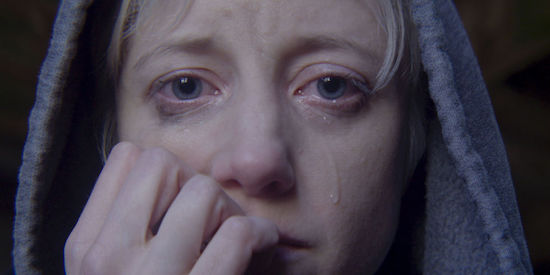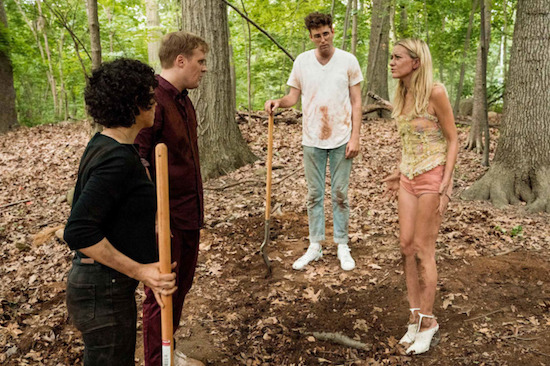Search Party
Under certain circumstances we are all capable of murder. Perhaps. Or at least that’s what TV wants us to believe about ourselves. TV shows Search Party, Big Little Lies and Black Mirror have all placed the unlikely, the circumstantial, and the accidental murder centre stage. And today’s TV murderers are not suspicious Agatha Christie-style bachelors or a hardened criminal from a Law & Order episode, but instead they are fleshed-out, relatable characters who have jobs, deadlines, demanding children, and annoying friends – just like us.
It’s this depiction that TV networks have seized on of late – morphing killers into paranoid, deer-in-the-headlights, everyday people. TV creators are keen to remind us that a potential murderer is nearby or even within all of us. According to official FBI statistics, in the US alone, around 65% of all homicides remain unsolved. Furthermore, 88% of all murders are likely to be by someone the victim knows. Taking these two statistics together shows us how murderers are hiding undiscovered in plain-sight: in our families, friendship groups or workplaces. TV previously taught us that killers were caught by the end of the episode. This is no longer the case.
When Ron Livingston’s dodgy PI Keith begins to throttle wayward hipster Dory, played expertly by Arrested Development’s Alia Shakat, Search Party suddenly changed tone from an urban hipster rom-com to what New York Times labelled “its own genre: the noir sitcom”. Dory’s DIY investigative search for her missing college alumni did not in fact unearth Chantal Witherbottom but rather it gave birth to Dory and her boyfriend Drew’s murderous capabilities. To protect Dory, Drew impulsively kills Keith with a hugely ironic candlestick, but Drew and Dory aren’t villains – they are hapless Brooklynites who chose to kill when faced with their own mortality. By proxy, their two friends Elliot and Portia become embroiled, foolishly advising them to bury the body rather than call the police. Suddenly audiences began switching on in their millions. America was interested.
Are these people naturally this horribly calculating? Or did the climactic season twist force them to become that? Or are viewers more galvanized by watching these self-entitled hipsters suffer? It’s likely to be the latter two. No matter how annoying, its fairly obvious they’re in way over their heads. Dory naively, or in a moment of clarity, confesses “I guess I just miss when my problems were about nothing”. As the horror of the aftermath becomes all-too-consuming, there is no time for Instagram selfies, brunches, and vintage clothes shopping. At one point, she works herself up into such a frenzy that she ends up passing out in the middle of a Williamsburg Park, for all other hipsters to see.
The TBS network have yet to confirm a third instalment, even when the show’s creators leave audiences on a cliff-edge with a shocking season finale of a second killing. Dory seemingly left with no option, pushes a black-mailing neighbour off a Staten Island ferry. Appearing not so unwilling anymore, fully embracing the darker depths of her personality; she realizes that if cornered, she will attack, and she will kill. Despite it being an improbable season conclusion, the transformation of these self-involved millennials into reluctant baby Walter Whites is a fascinating watch.
Mia Nolan, the protagonist of Black Mirror season four’s ‘Crocodile’, is a more extreme example. Played by an unrecognisable Andrea Riseborough, Mia is plagued by a discrepancy in her youth: aiding and abetting her then boyfriend in dumping a body he accidentally run over. Things reach a crescendo in later life when the guilt-ridden ex-boyfriend threatens to turn himself in. In a moment of panic, Mia sloppily chokes him to death only for it to lead to a series of further killings in a desperate effort to cover her tracks. Her driving force is, understandably, a fear of losing everything she meticulously built: an award-winning career, a loving husband, a nine-year old son as well a stunningly large house, straight out of Architectural Digest.

Black Mirror
Charlie Brooker peppers Mia’s behaviour with various warm touches in a bid for us to sympathize with her. The burden of guilt becomes emotionally exhausting, it was only a matter of time that the years of pent-up tension would be unleashed. Brooker also has Mia in a continual state of remorse, the more she kills the worse she feels; heavily weeping before each murder, even apologizing to one of her victims. But, does seeing Mia’s trajectory from innocent car passenger to a fully-fledged murder make her more amenable? In some moments yes, as the circumstances did indeed coerce her to kill. However, in other moments, no. Appearing outside a victim’s house wielding a hammer hints at an already predisposed cold-blooded killer.
In contrast to Riseborough’s unhinged, rugged mother, a more empathetic deed is the single murder committed by five sophisticated suburban mothers in HBO’s Big Little Lies. One of the mothers, Nicole Kidman’s Celeste Wright, is beaten to a pulp repeatedly by physically abusive husband, Perry (Alexander Skarsgard), throughout the course of the mini-series. In the final episode, a heated altercation between an unrelenting Perry and the five women ends with them killing him. This is a dark but welcome conclusion to a deeply distressing story line. Both Kidman and her viewers are finally given some relief.
This murder, the discovery of which could easily transform their middle-class lives, doesn’t haunt or tarnish them, but instead transforms them into powerful and just vigilantes. In the very final scene, a silent montage of all five women, murderers, embracing each other and looking out towards the tempestuous sea, seems to represent their shared vulnerability but also their new-found power, the knowledge of what they are capable of in the name of self-protection.
And the final scene of Big Little Lies sets the scene for how these accidental murderers may develop in future TV shows. Their narrative arcs are not aimed towards legal reprisals or punishment but rather the psychological effects of unpunished murder, guilt or self-appointed justice. Echoing Judith Butler’s edict, “we are all capable of murder when we realise just how precarious life really is,” murderers are no longer imprisoned or far removed from us. Instead, it could be anyone of us who is simply unlucky enough to be in the wrong place at the wrong time.



